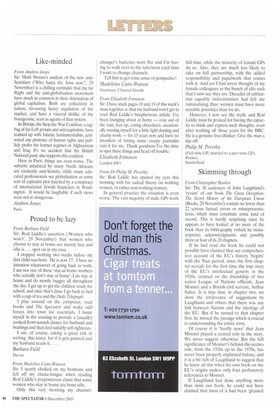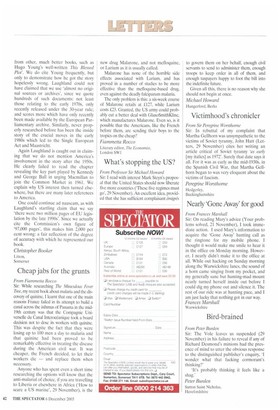Skimming through
From Christopher Booker Sir: The 30 sentences of John Laughland's 'review' of our book The Great Deception: The Secret History of the European Union (Books, 29 November) contain no fewer than 22 serious factual errors or misrepresentations, which must constitute some kind of record. This is hardly surprising since he appears to have looked at no more of the book than its bibliography (which he misinterprets), acknowledgments and possibly three or four of its 20 chapters.
If he had read the book he could not possibly have claimed that our comprehensive account of the EU's history 'begins' with the Nazi period, since the first chapter reveals for the first time the true story of the EU's intellectual genesis in the 1920s, centred on the friendship of two senior League of Nations officials, Jean Monnet and a British civil servant, Arthur Salter. It is true that, in chapter two, we show the irrelevance of suggestions by Laughland and others that there was any link between Nazism and the ideology of the EU. But if he turned to that chapter first, he missed the passage which is crucial to understanding the entire story.
Of course it is 'hardly news' that Jean Monnet played a central role in the story. We never suggest otherwise. But the full significance of Monnet's behind-the-scenes role, from the 1920s up to the 1970s, has never been properly explained before; and it is a bit rich of Laughland to suggest that he knew all this when his own book on the EU's origins makes only four perfunctory references to Monnet.
If Laughland had done anything more than skim our book, he could not have claimed that most of it had been 'gleaned from other, much better books, such as Hugo Young's well-written This Blessed Plot'. We do cite Young frequently, but only to demonstrate how he got the story hopelessly wrong. Laughland could not have claimed that we use 'almost no original sources or archives', since we quote hundreds of such documents: not least those relating to the early 1970s, only recently released under the 30-year rule; and scores more which have only recently been made available by the European Parliamentary archive. Similarly, never properly researched before has been the inside story of the crucial moves in the early 1980s which led to the Single European Act and Maastricht.
Again Laughland is caught out in claiming that we do not mention America's involvement in the story after the 1950s. He clearly failed to read the chapter revealing the key part played by Kennedy and George Ball in urging Macmillan to join the Common Market in 1961. We explain why US interest then turned elsewhere, but there are many later references to America.
One could continue ad nauseam, as with Laughland's startling claim that we say 'there were two million pages of EU legislation by the late 1990s'. Since we actually cite the Commission's own figure of '97,000 pages', this makes him 2,000 per cent wrong: a fair reflection of the degree of accuracy with which he represented our book.
Christopher Booker
Litton, Somerset



























































































 Previous page
Previous page